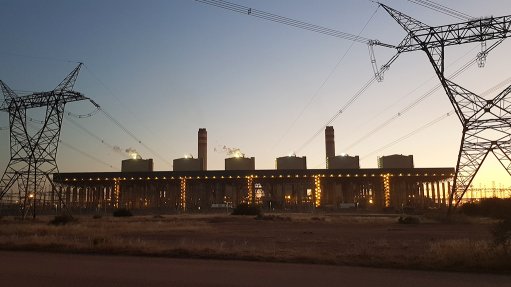Business confidence improves on 2020 benchmark, says Sacci
The South African Chamber of Commerce and Industry (Sacci) reports that its Business Confidence Index (BCI) for July, at 110.3, was 1.8 index points higher than in June and 6.1 points higher than in May.
Sacci had adjusted the reference point, or base year, of its BCI to 2020 and the benchmark representing 100 points, giving the Sacci BCI a more recent reference point and taking account of up-to-date information and changing trends in the economy and financial markets.
The BCI for July was 2.6 index points above the Sacci BCI of July 2021, while the average of 108.6 for the first half of this year was 1.5 index points higher than the average for the second half of 2021.
Sacci says the July BCI number indicates that the business climate is gradually returning to normality, as increased merchandise export and import volumes, and more new vehicles sold made positive contributions to the business climate in the short term (month-to-month) in July.
However, Sacci also notes that higher inflation, a weaker and volatile rand exchange rate and higher real interest rates weighed negatively on the business environment.
The BCI for June and July indicates that the negative medium term (year-on-year) business sentiment of May was replaced by positive developments when compared with the same period in 2021.
The most negative year-on-year impacts were from the financial environment, namely rising inflation, increased real financing costs and a weaker and volatile rand.
Positively, tourism into South Africa recovered markedly, while higher new-vehicle sales point towards medium-term investment, Sacci reports.
Real credit extension to the private sector was also more readily available notwithstanding higher debt servicing costs.
The present business climate is affected by rising global inflation and by distortions of global supply chains and commodity markets. South Africa’s economic situation prevailed with business confidence in a “holding” position at present, Sacci notes.
For August, Sacci says, the uncertain outlook for the global economy remains after the partial recovery in 2021, as Russia’s invasion of Ukraine caused further disruption in food output and the price of crude oil.
The chamber also notes that there is “talk” of a renewed global recession, after global growth prospects declined in the second quarter as growth in China and Russia slowed and US household expenditure was below forecast.
An already-debilitated world economy as a result of the Covid-19 pandemic and related lockdowns, fiscal stimulation and an easy monetary stance, have given rise to high worldwide inflationary expectations, notably in the US and major European economies, Sacci says.
In the latest World Economic Outlook, the International Monetary Fund (IMF) lowered its global growth forecast to 3.2% for this year and 2.9% for 2023. Growth for sub-Saharan Africa is anticipated at 3.8% this year and 4% for 2023.
Although South Africa could experience growth of 2.3% this year, according to the IMF, structural impediments could result in slow growth of 1.4% in 2023.
In this regard, Sacci points to South Africa finding it difficult to accelerate economic growth to a level that addresses the excessive unemployment level to more acceptable levels. The level of fixed investment is not at the target level of 25% of gross domestic product (GDP) to support growth of at least 3% a year on a continued basis.
Apart from a fixed investment of about 14% of GDP currently, South Africa does not generate the savings to finance the capital requirements from domestic sources, Sacci states.
South Africa is in a position where it borrows long to finance recurrent expenditure by government, thereby crowding out capital markets and making investment even more difficult. The dependence on foreign capital inflows hinges on business and investor confidence levels, Sacci says.
Further, Eskom´s electricity generation shortages in July, further exacerbated by industrial action, placed Eskom’s financial position in further difficulty. It is estimated that the recent load-shedding caused significant costs to the economy with more than R4-billion a day lost from the GDP during Stage 6 load-shedding.
The higher cost of international crude oil not only affected Eskom, but also added a substantial portion to the producer price index (PPI) and consumer price index (CPI), Sacci points out.
With CPI increasing by 0.9 of a percentage point between May and June, to reach 7.4%, and the PPI increasing by 1.5 of a percentage point between the two months to record 16.2% in June, the acceleration in inflation compelled the Reserve Bank to act strongly to contain inflation.
As such, the repo rate was raised by 75 basis points in July.
Despite the higher cost of credit, Sacci says credit to the private sector increased faster by 7.5% in June and the money supply by 8.3%.
“This monetary expansion could spell danger for general price stability,” the chamber notes.
Article Enquiry
Email Article
Save Article
Feedback
To advertise email advertising@creamermedia.co.za or click here
Press Office
Announcements
What's On
Subscribe to improve your user experience...
Option 1 (equivalent of R125 a month):
Receive a weekly copy of Creamer Media's Engineering News & Mining Weekly magazine
(print copy for those in South Africa and e-magazine for those outside of South Africa)
Receive daily email newsletters
Access to full search results
Access archive of magazine back copies
Access to Projects in Progress
Access to ONE Research Report of your choice in PDF format
Option 2 (equivalent of R375 a month):
All benefits from Option 1
PLUS
Access to Creamer Media's Research Channel Africa for ALL Research Reports, in PDF format, on various industrial and mining sectors
including Electricity; Water; Energy Transition; Hydrogen; Roads, Rail and Ports; Coal; Gold; Platinum; Battery Metals; etc.
Already a subscriber?
Forgotten your password?
Receive weekly copy of Creamer Media's Engineering News & Mining Weekly magazine (print copy for those in South Africa and e-magazine for those outside of South Africa)
➕
Recieve daily email newsletters
➕
Access to full search results
➕
Access archive of magazine back copies
➕
Access to Projects in Progress
➕
Access to ONE Research Report of your choice in PDF format
RESEARCH CHANNEL AFRICA
R4500 (equivalent of R375 a month)
SUBSCRIBEAll benefits from Option 1
➕
Access to Creamer Media's Research Channel Africa for ALL Research Reports on various industrial and mining sectors, in PDF format, including on:
Electricity
➕
Water
➕
Energy Transition
➕
Hydrogen
➕
Roads, Rail and Ports
➕
Coal
➕
Gold
➕
Platinum
➕
Battery Metals
➕
etc.
Receive all benefits from Option 1 or Option 2 delivered to numerous people at your company
➕
Multiple User names and Passwords for simultaneous log-ins
➕
Intranet integration access to all in your organisation


















